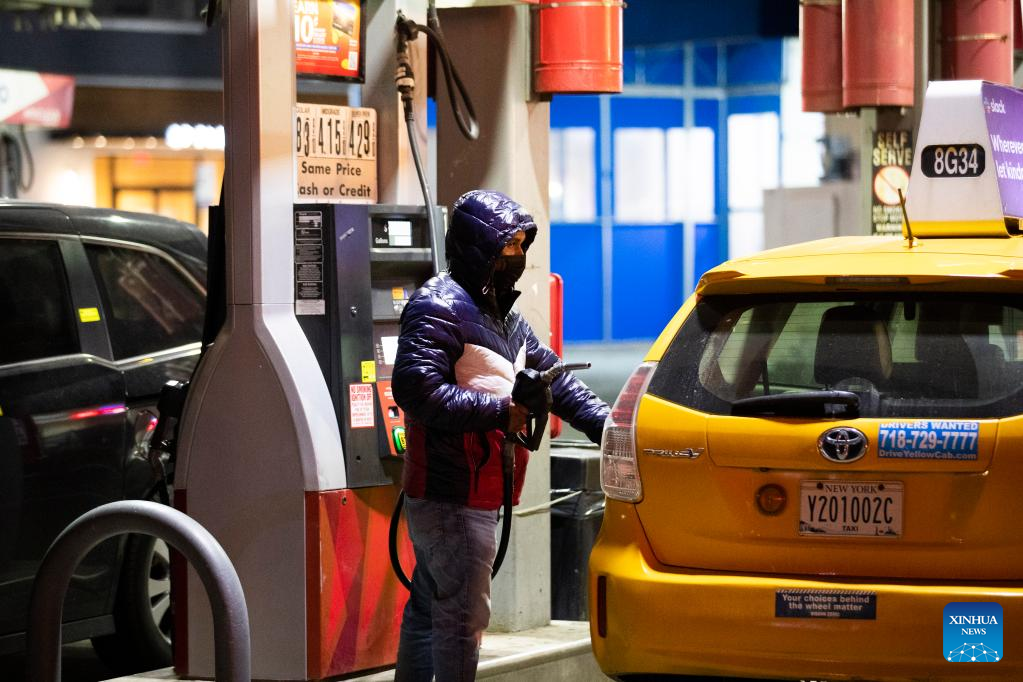US hurt by high gas prices
- By Mitchell Blatt
 0 Comment(s)
0 Comment(s) Print
Print E-mail China.org.cn, March 29, 2022
E-mail China.org.cn, March 29, 2022

Oil prices have been rising amid growing supply concerns due to the Russia-Ukraine conflict. Now the U.S. has also blocked sales of Russian oil as part of their sanctions.
The result is that crude oil shot past $100 (91 euros) a barrel, with the price of WTI Crude increasing by about 50% since January 1. U.S. gas prices hit an average of $4.23 a gallon (0.85 euro/liter), the highest price the Department of Energy has ever recorded.
Prices in Europe, which were already higher than in the U.S., have also been rising. A liter of petrol in the U.K. is up from the equivalent of 1.74 euros in January to 1.99 euros now. In Germany, the price even topped 2 euros a liter.
But high gas prices hurt Americans more than people in most of the world because Americans live a gas-obsessed lifestyle. Americans consume 8.7 million barrels of petrol per day. That's five times as much as China. The average American consumes 4.4 liters per day – more than anywhere else in the world – and 11 times that of the average French person.
American life revolves around owning and driving a car. According to a National Geographic Society survey of about two dozen mostly developed countries, the United States had the highest rate of car ownership at 92%. Many Americans own two or three cars.
It is difficult to get around in America without a car. According to the same survey, Americans ranked last in terms of how often they use public transportation. Just 11% of Americans said they took the metro or bus once in a typical month, compared to 87% of Russians, 81% of Chinese, and 58% of Spaniards.
Americans don't take public transit in large part because it is not available to most Americans. Just 18% said rapid transit was easily available. Even in cities like New York, one of the few with a vast underground network, the trains are dirty, rarely on time, and violent encounters are not uncommon in the stations.
Americans also don't walk or bike to many destinations. Just a quarter of Americans said they walk or bike somewhere often, compared to half of Chinese and nearly three-quarters of Germans. And when Americans do drive, they are more likely to drive huge gas-guzzling vehicles, costing their pocketbooks and the planet.
Americans are stubbornly attached to their hunks of four-wheeled metal. A car, to an American, is not just a tool, but part of an identity. They're called "a symbol of independence and personal freedom." But if one requires so much high-priced oil to operate, how can a car make someone free? It just makes someone a slave to oil.
The automobile has also influenced the design of American cities in that they are more like sprawling parking lots nearly impossible to navigate without a car, and the never-ending subdivided suburbs most Americans live in are miles away from shopping and leisure. Cars have effectively trapped Americans in place. Author Edward Humes has written, "In almost every way imaginable, the car, as it is deployed and used today, is insane."
Americans are hurting. They are cutting down on social engagements. Pizza delivery drivers are losing money. There are stories about people turning down higher-paying jobs to avoid longer commutes. Even grandparents cannot afford to drive to their children's homes and look after the grandkids.
Unfortunately, for many decades, Americans have designed a culture and lifestyle – and the cities that support it – that gives priority to automobiles over people. Their lifestyle has made them uniquely impacted by the high gasoline prices the world is facing now.
But America's addiction to oil is not just hurting its people; it's hurting the world, too. By using so much oil for inefficient personal use, the U.S. is doing untold damage to the climate. Americans must find a way to become less oil-dependent for their own good and the good of the world.
Mitchell Blatt is a columnist with China.org.cn. For more information please visit:
http://m.formacion-profesional-a-distancia.com/opinion/MitchellBlatt.htm
Opinion articles reflect the views of their authors, not necessarily those of China.org.cn.
If you would like to contribute, please contact us at opinion@china.org.cn.





